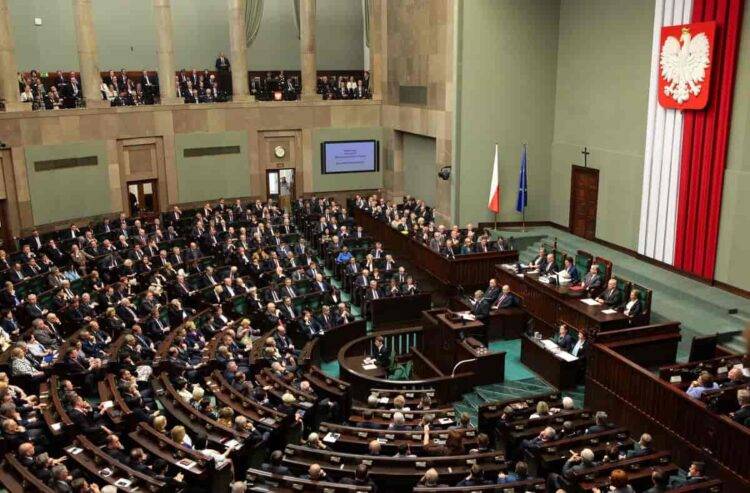In a landmark move, Poland’s parliament, under its new leadership, is gearing up to reverse a significant policy of the previous nationalist administration by reinstating government funding for in vitro fertilization (IVF) treatments. This decision marks a departure from the conservative stance of the outgoing Law and Justice (PiS) party, which had ceased these reimbursements after ascending to power in 2015, reflecting the nation’s shift towards conservatism and the government’s alignment with the influential Roman Catholic Church.
The recent electoral victory of a coalition of opposition parties, set to assume power imminently, has paved the way for this policy reversal. The opposition, led by the Civic Coalition, has expressed its commitment to restoring IVF funding. “We are going to … vote it through Wednesday,” stated Agnieszka Pomaska, a member of parliament from the Civic Coalition.
The proposed bill, supported by a public petition, is scheduled for a parliamentary vote. It aims to allocate a minimum of 500 million złoty (€115 million) for IVF procedures starting in 2024, significantly expanding access to these treatments. “The new rules will be in force in 2024 and the financing that they will secure — no less than 500 million złoty (€115 million) will guarantee a wide access to IVF procedures,” added Pomaska.
Following the PiS party’s decision to end state support for IVF, several liberal local governments had introduced their own funding schemes, albeit on a smaller scale. Pomaska highlighted the importance of this move, stating, “Now the financing will level the playing field for couples seeking to have children. It was a thing for the rich otherwise, with costs running into tens of thousands of złoty.”
- Follow us on Facebook and X (Twitter) to stay up to date with News from Poland.
The PiS government had previously favored alternative methods like naprotechnology, endorsed by the Catholic Church, over state-backed IVF, citing ethical concerns regarding the treatment of embryos. Maria Kurowska, a member of the right-wing Sovereign Poland party, a PiS coalition partner, emphasized these concerns during a parliamentary debate: “If we consider that all embryos are human beings, which they are, then please note, ladies and gentlemen, that, on average, the life of one child is paid for by the death of six of his brothers and sisters.”
While the bill is expected to pass through parliament, it still requires the signature of President Andrzej Duda, an ally of the socially conservative PiS party. Marcin Mastalerek, Duda’s chief of staff, expressed cautious optimism about the president’s stance: “Knowing President Duda and to the best of my knowledge, the president will not block such a project, but of course he needs to see the final version on his desk.”
This development in Poland’s parliament signals a significant shift in the country’s approach to reproductive health and reflects the changing political dynamics following the recent elections.
- More News from Poland on our Homepage.
- Sign up to our Newsletter
In a landmark move, Poland’s parliament, under its new leadership, is gearing up to reverse a significant policy of the previous nationalist administration by reinstating government funding for in vitro fertilization (IVF) treatments. This decision marks a departure from the conservative stance of the outgoing Law and Justice (PiS) party, which had ceased these reimbursements after ascending to power in 2015, reflecting the nation’s shift towards conservatism and the government’s alignment with the influential Roman Catholic Church.
The recent electoral victory of a coalition of opposition parties, set to assume power imminently, has paved the way for this policy reversal. The opposition, led by the Civic Coalition, has expressed its commitment to restoring IVF funding. “We are going to … vote it through Wednesday,” stated Agnieszka Pomaska, a member of parliament from the Civic Coalition.
The proposed bill, supported by a public petition, is scheduled for a parliamentary vote. It aims to allocate a minimum of 500 million złoty (€115 million) for IVF procedures starting in 2024, significantly expanding access to these treatments. “The new rules will be in force in 2024 and the financing that they will secure — no less than 500 million złoty (€115 million) will guarantee a wide access to IVF procedures,” added Pomaska.
Following the PiS party’s decision to end state support for IVF, several liberal local governments had introduced their own funding schemes, albeit on a smaller scale. Pomaska highlighted the importance of this move, stating, “Now the financing will level the playing field for couples seeking to have children. It was a thing for the rich otherwise, with costs running into tens of thousands of złoty.”
- Follow us on Facebook and X (Twitter) to stay up to date with News from Poland.
The PiS government had previously favored alternative methods like naprotechnology, endorsed by the Catholic Church, over state-backed IVF, citing ethical concerns regarding the treatment of embryos. Maria Kurowska, a member of the right-wing Sovereign Poland party, a PiS coalition partner, emphasized these concerns during a parliamentary debate: “If we consider that all embryos are human beings, which they are, then please note, ladies and gentlemen, that, on average, the life of one child is paid for by the death of six of his brothers and sisters.”
While the bill is expected to pass through parliament, it still requires the signature of President Andrzej Duda, an ally of the socially conservative PiS party. Marcin Mastalerek, Duda’s chief of staff, expressed cautious optimism about the president’s stance: “Knowing President Duda and to the best of my knowledge, the president will not block such a project, but of course he needs to see the final version on his desk.”
This development in Poland’s parliament signals a significant shift in the country’s approach to reproductive health and reflects the changing political dynamics following the recent elections.
- More News from Poland on our Homepage.
- Sign up to our Newsletter
In a landmark move, Poland’s parliament, under its new leadership, is gearing up to reverse a significant policy of the previous nationalist administration by reinstating government funding for in vitro fertilization (IVF) treatments. This decision marks a departure from the conservative stance of the outgoing Law and Justice (PiS) party, which had ceased these reimbursements after ascending to power in 2015, reflecting the nation’s shift towards conservatism and the government’s alignment with the influential Roman Catholic Church.
The recent electoral victory of a coalition of opposition parties, set to assume power imminently, has paved the way for this policy reversal. The opposition, led by the Civic Coalition, has expressed its commitment to restoring IVF funding. “We are going to … vote it through Wednesday,” stated Agnieszka Pomaska, a member of parliament from the Civic Coalition.
The proposed bill, supported by a public petition, is scheduled for a parliamentary vote. It aims to allocate a minimum of 500 million złoty (€115 million) for IVF procedures starting in 2024, significantly expanding access to these treatments. “The new rules will be in force in 2024 and the financing that they will secure — no less than 500 million złoty (€115 million) will guarantee a wide access to IVF procedures,” added Pomaska.
Following the PiS party’s decision to end state support for IVF, several liberal local governments had introduced their own funding schemes, albeit on a smaller scale. Pomaska highlighted the importance of this move, stating, “Now the financing will level the playing field for couples seeking to have children. It was a thing for the rich otherwise, with costs running into tens of thousands of złoty.”
- Follow us on Facebook and X (Twitter) to stay up to date with News from Poland.
The PiS government had previously favored alternative methods like naprotechnology, endorsed by the Catholic Church, over state-backed IVF, citing ethical concerns regarding the treatment of embryos. Maria Kurowska, a member of the right-wing Sovereign Poland party, a PiS coalition partner, emphasized these concerns during a parliamentary debate: “If we consider that all embryos are human beings, which they are, then please note, ladies and gentlemen, that, on average, the life of one child is paid for by the death of six of his brothers and sisters.”
While the bill is expected to pass through parliament, it still requires the signature of President Andrzej Duda, an ally of the socially conservative PiS party. Marcin Mastalerek, Duda’s chief of staff, expressed cautious optimism about the president’s stance: “Knowing President Duda and to the best of my knowledge, the president will not block such a project, but of course he needs to see the final version on his desk.”
This development in Poland’s parliament signals a significant shift in the country’s approach to reproductive health and reflects the changing political dynamics following the recent elections.
- More News from Poland on our Homepage.
- Sign up to our Newsletter
In a landmark move, Poland’s parliament, under its new leadership, is gearing up to reverse a significant policy of the previous nationalist administration by reinstating government funding for in vitro fertilization (IVF) treatments. This decision marks a departure from the conservative stance of the outgoing Law and Justice (PiS) party, which had ceased these reimbursements after ascending to power in 2015, reflecting the nation’s shift towards conservatism and the government’s alignment with the influential Roman Catholic Church.
The recent electoral victory of a coalition of opposition parties, set to assume power imminently, has paved the way for this policy reversal. The opposition, led by the Civic Coalition, has expressed its commitment to restoring IVF funding. “We are going to … vote it through Wednesday,” stated Agnieszka Pomaska, a member of parliament from the Civic Coalition.
The proposed bill, supported by a public petition, is scheduled for a parliamentary vote. It aims to allocate a minimum of 500 million złoty (€115 million) for IVF procedures starting in 2024, significantly expanding access to these treatments. “The new rules will be in force in 2024 and the financing that they will secure — no less than 500 million złoty (€115 million) will guarantee a wide access to IVF procedures,” added Pomaska.
Following the PiS party’s decision to end state support for IVF, several liberal local governments had introduced their own funding schemes, albeit on a smaller scale. Pomaska highlighted the importance of this move, stating, “Now the financing will level the playing field for couples seeking to have children. It was a thing for the rich otherwise, with costs running into tens of thousands of złoty.”
- Follow us on Facebook and X (Twitter) to stay up to date with News from Poland.
The PiS government had previously favored alternative methods like naprotechnology, endorsed by the Catholic Church, over state-backed IVF, citing ethical concerns regarding the treatment of embryos. Maria Kurowska, a member of the right-wing Sovereign Poland party, a PiS coalition partner, emphasized these concerns during a parliamentary debate: “If we consider that all embryos are human beings, which they are, then please note, ladies and gentlemen, that, on average, the life of one child is paid for by the death of six of his brothers and sisters.”
While the bill is expected to pass through parliament, it still requires the signature of President Andrzej Duda, an ally of the socially conservative PiS party. Marcin Mastalerek, Duda’s chief of staff, expressed cautious optimism about the president’s stance: “Knowing President Duda and to the best of my knowledge, the president will not block such a project, but of course he needs to see the final version on his desk.”
This development in Poland’s parliament signals a significant shift in the country’s approach to reproductive health and reflects the changing political dynamics following the recent elections.
- More News from Poland on our Homepage.
- Sign up to our Newsletter
In a landmark move, Poland’s parliament, under its new leadership, is gearing up to reverse a significant policy of the previous nationalist administration by reinstating government funding for in vitro fertilization (IVF) treatments. This decision marks a departure from the conservative stance of the outgoing Law and Justice (PiS) party, which had ceased these reimbursements after ascending to power in 2015, reflecting the nation’s shift towards conservatism and the government’s alignment with the influential Roman Catholic Church.
The recent electoral victory of a coalition of opposition parties, set to assume power imminently, has paved the way for this policy reversal. The opposition, led by the Civic Coalition, has expressed its commitment to restoring IVF funding. “We are going to … vote it through Wednesday,” stated Agnieszka Pomaska, a member of parliament from the Civic Coalition.
The proposed bill, supported by a public petition, is scheduled for a parliamentary vote. It aims to allocate a minimum of 500 million złoty (€115 million) for IVF procedures starting in 2024, significantly expanding access to these treatments. “The new rules will be in force in 2024 and the financing that they will secure — no less than 500 million złoty (€115 million) will guarantee a wide access to IVF procedures,” added Pomaska.
Following the PiS party’s decision to end state support for IVF, several liberal local governments had introduced their own funding schemes, albeit on a smaller scale. Pomaska highlighted the importance of this move, stating, “Now the financing will level the playing field for couples seeking to have children. It was a thing for the rich otherwise, with costs running into tens of thousands of złoty.”
- Follow us on Facebook and X (Twitter) to stay up to date with News from Poland.
The PiS government had previously favored alternative methods like naprotechnology, endorsed by the Catholic Church, over state-backed IVF, citing ethical concerns regarding the treatment of embryos. Maria Kurowska, a member of the right-wing Sovereign Poland party, a PiS coalition partner, emphasized these concerns during a parliamentary debate: “If we consider that all embryos are human beings, which they are, then please note, ladies and gentlemen, that, on average, the life of one child is paid for by the death of six of his brothers and sisters.”
While the bill is expected to pass through parliament, it still requires the signature of President Andrzej Duda, an ally of the socially conservative PiS party. Marcin Mastalerek, Duda’s chief of staff, expressed cautious optimism about the president’s stance: “Knowing President Duda and to the best of my knowledge, the president will not block such a project, but of course he needs to see the final version on his desk.”
This development in Poland’s parliament signals a significant shift in the country’s approach to reproductive health and reflects the changing political dynamics following the recent elections.
- More News from Poland on our Homepage.
- Sign up to our Newsletter
In a landmark move, Poland’s parliament, under its new leadership, is gearing up to reverse a significant policy of the previous nationalist administration by reinstating government funding for in vitro fertilization (IVF) treatments. This decision marks a departure from the conservative stance of the outgoing Law and Justice (PiS) party, which had ceased these reimbursements after ascending to power in 2015, reflecting the nation’s shift towards conservatism and the government’s alignment with the influential Roman Catholic Church.
The recent electoral victory of a coalition of opposition parties, set to assume power imminently, has paved the way for this policy reversal. The opposition, led by the Civic Coalition, has expressed its commitment to restoring IVF funding. “We are going to … vote it through Wednesday,” stated Agnieszka Pomaska, a member of parliament from the Civic Coalition.
The proposed bill, supported by a public petition, is scheduled for a parliamentary vote. It aims to allocate a minimum of 500 million złoty (€115 million) for IVF procedures starting in 2024, significantly expanding access to these treatments. “The new rules will be in force in 2024 and the financing that they will secure — no less than 500 million złoty (€115 million) will guarantee a wide access to IVF procedures,” added Pomaska.
Following the PiS party’s decision to end state support for IVF, several liberal local governments had introduced their own funding schemes, albeit on a smaller scale. Pomaska highlighted the importance of this move, stating, “Now the financing will level the playing field for couples seeking to have children. It was a thing for the rich otherwise, with costs running into tens of thousands of złoty.”
- Follow us on Facebook and X (Twitter) to stay up to date with News from Poland.
The PiS government had previously favored alternative methods like naprotechnology, endorsed by the Catholic Church, over state-backed IVF, citing ethical concerns regarding the treatment of embryos. Maria Kurowska, a member of the right-wing Sovereign Poland party, a PiS coalition partner, emphasized these concerns during a parliamentary debate: “If we consider that all embryos are human beings, which they are, then please note, ladies and gentlemen, that, on average, the life of one child is paid for by the death of six of his brothers and sisters.”
While the bill is expected to pass through parliament, it still requires the signature of President Andrzej Duda, an ally of the socially conservative PiS party. Marcin Mastalerek, Duda’s chief of staff, expressed cautious optimism about the president’s stance: “Knowing President Duda and to the best of my knowledge, the president will not block such a project, but of course he needs to see the final version on his desk.”
This development in Poland’s parliament signals a significant shift in the country’s approach to reproductive health and reflects the changing political dynamics following the recent elections.
- More News from Poland on our Homepage.
- Sign up to our Newsletter
In a landmark move, Poland’s parliament, under its new leadership, is gearing up to reverse a significant policy of the previous nationalist administration by reinstating government funding for in vitro fertilization (IVF) treatments. This decision marks a departure from the conservative stance of the outgoing Law and Justice (PiS) party, which had ceased these reimbursements after ascending to power in 2015, reflecting the nation’s shift towards conservatism and the government’s alignment with the influential Roman Catholic Church.
The recent electoral victory of a coalition of opposition parties, set to assume power imminently, has paved the way for this policy reversal. The opposition, led by the Civic Coalition, has expressed its commitment to restoring IVF funding. “We are going to … vote it through Wednesday,” stated Agnieszka Pomaska, a member of parliament from the Civic Coalition.
The proposed bill, supported by a public petition, is scheduled for a parliamentary vote. It aims to allocate a minimum of 500 million złoty (€115 million) for IVF procedures starting in 2024, significantly expanding access to these treatments. “The new rules will be in force in 2024 and the financing that they will secure — no less than 500 million złoty (€115 million) will guarantee a wide access to IVF procedures,” added Pomaska.
Following the PiS party’s decision to end state support for IVF, several liberal local governments had introduced their own funding schemes, albeit on a smaller scale. Pomaska highlighted the importance of this move, stating, “Now the financing will level the playing field for couples seeking to have children. It was a thing for the rich otherwise, with costs running into tens of thousands of złoty.”
- Follow us on Facebook and X (Twitter) to stay up to date with News from Poland.
The PiS government had previously favored alternative methods like naprotechnology, endorsed by the Catholic Church, over state-backed IVF, citing ethical concerns regarding the treatment of embryos. Maria Kurowska, a member of the right-wing Sovereign Poland party, a PiS coalition partner, emphasized these concerns during a parliamentary debate: “If we consider that all embryos are human beings, which they are, then please note, ladies and gentlemen, that, on average, the life of one child is paid for by the death of six of his brothers and sisters.”
While the bill is expected to pass through parliament, it still requires the signature of President Andrzej Duda, an ally of the socially conservative PiS party. Marcin Mastalerek, Duda’s chief of staff, expressed cautious optimism about the president’s stance: “Knowing President Duda and to the best of my knowledge, the president will not block such a project, but of course he needs to see the final version on his desk.”
This development in Poland’s parliament signals a significant shift in the country’s approach to reproductive health and reflects the changing political dynamics following the recent elections.
- More News from Poland on our Homepage.
- Sign up to our Newsletter
In a landmark move, Poland’s parliament, under its new leadership, is gearing up to reverse a significant policy of the previous nationalist administration by reinstating government funding for in vitro fertilization (IVF) treatments. This decision marks a departure from the conservative stance of the outgoing Law and Justice (PiS) party, which had ceased these reimbursements after ascending to power in 2015, reflecting the nation’s shift towards conservatism and the government’s alignment with the influential Roman Catholic Church.
The recent electoral victory of a coalition of opposition parties, set to assume power imminently, has paved the way for this policy reversal. The opposition, led by the Civic Coalition, has expressed its commitment to restoring IVF funding. “We are going to … vote it through Wednesday,” stated Agnieszka Pomaska, a member of parliament from the Civic Coalition.
The proposed bill, supported by a public petition, is scheduled for a parliamentary vote. It aims to allocate a minimum of 500 million złoty (€115 million) for IVF procedures starting in 2024, significantly expanding access to these treatments. “The new rules will be in force in 2024 and the financing that they will secure — no less than 500 million złoty (€115 million) will guarantee a wide access to IVF procedures,” added Pomaska.
Following the PiS party’s decision to end state support for IVF, several liberal local governments had introduced their own funding schemes, albeit on a smaller scale. Pomaska highlighted the importance of this move, stating, “Now the financing will level the playing field for couples seeking to have children. It was a thing for the rich otherwise, with costs running into tens of thousands of złoty.”
- Follow us on Facebook and X (Twitter) to stay up to date with News from Poland.
The PiS government had previously favored alternative methods like naprotechnology, endorsed by the Catholic Church, over state-backed IVF, citing ethical concerns regarding the treatment of embryos. Maria Kurowska, a member of the right-wing Sovereign Poland party, a PiS coalition partner, emphasized these concerns during a parliamentary debate: “If we consider that all embryos are human beings, which they are, then please note, ladies and gentlemen, that, on average, the life of one child is paid for by the death of six of his brothers and sisters.”
While the bill is expected to pass through parliament, it still requires the signature of President Andrzej Duda, an ally of the socially conservative PiS party. Marcin Mastalerek, Duda’s chief of staff, expressed cautious optimism about the president’s stance: “Knowing President Duda and to the best of my knowledge, the president will not block such a project, but of course he needs to see the final version on his desk.”
This development in Poland’s parliament signals a significant shift in the country’s approach to reproductive health and reflects the changing political dynamics following the recent elections.
- More News from Poland on our Homepage.
- Sign up to our Newsletter
In a landmark move, Poland’s parliament, under its new leadership, is gearing up to reverse a significant policy of the previous nationalist administration by reinstating government funding for in vitro fertilization (IVF) treatments. This decision marks a departure from the conservative stance of the outgoing Law and Justice (PiS) party, which had ceased these reimbursements after ascending to power in 2015, reflecting the nation’s shift towards conservatism and the government’s alignment with the influential Roman Catholic Church.
The recent electoral victory of a coalition of opposition parties, set to assume power imminently, has paved the way for this policy reversal. The opposition, led by the Civic Coalition, has expressed its commitment to restoring IVF funding. “We are going to … vote it through Wednesday,” stated Agnieszka Pomaska, a member of parliament from the Civic Coalition.
The proposed bill, supported by a public petition, is scheduled for a parliamentary vote. It aims to allocate a minimum of 500 million złoty (€115 million) for IVF procedures starting in 2024, significantly expanding access to these treatments. “The new rules will be in force in 2024 and the financing that they will secure — no less than 500 million złoty (€115 million) will guarantee a wide access to IVF procedures,” added Pomaska.
Following the PiS party’s decision to end state support for IVF, several liberal local governments had introduced their own funding schemes, albeit on a smaller scale. Pomaska highlighted the importance of this move, stating, “Now the financing will level the playing field for couples seeking to have children. It was a thing for the rich otherwise, with costs running into tens of thousands of złoty.”
- Follow us on Facebook and X (Twitter) to stay up to date with News from Poland.
The PiS government had previously favored alternative methods like naprotechnology, endorsed by the Catholic Church, over state-backed IVF, citing ethical concerns regarding the treatment of embryos. Maria Kurowska, a member of the right-wing Sovereign Poland party, a PiS coalition partner, emphasized these concerns during a parliamentary debate: “If we consider that all embryos are human beings, which they are, then please note, ladies and gentlemen, that, on average, the life of one child is paid for by the death of six of his brothers and sisters.”
While the bill is expected to pass through parliament, it still requires the signature of President Andrzej Duda, an ally of the socially conservative PiS party. Marcin Mastalerek, Duda’s chief of staff, expressed cautious optimism about the president’s stance: “Knowing President Duda and to the best of my knowledge, the president will not block such a project, but of course he needs to see the final version on his desk.”
This development in Poland’s parliament signals a significant shift in the country’s approach to reproductive health and reflects the changing political dynamics following the recent elections.
- More News from Poland on our Homepage.
- Sign up to our Newsletter
In a landmark move, Poland’s parliament, under its new leadership, is gearing up to reverse a significant policy of the previous nationalist administration by reinstating government funding for in vitro fertilization (IVF) treatments. This decision marks a departure from the conservative stance of the outgoing Law and Justice (PiS) party, which had ceased these reimbursements after ascending to power in 2015, reflecting the nation’s shift towards conservatism and the government’s alignment with the influential Roman Catholic Church.
The recent electoral victory of a coalition of opposition parties, set to assume power imminently, has paved the way for this policy reversal. The opposition, led by the Civic Coalition, has expressed its commitment to restoring IVF funding. “We are going to … vote it through Wednesday,” stated Agnieszka Pomaska, a member of parliament from the Civic Coalition.
The proposed bill, supported by a public petition, is scheduled for a parliamentary vote. It aims to allocate a minimum of 500 million złoty (€115 million) for IVF procedures starting in 2024, significantly expanding access to these treatments. “The new rules will be in force in 2024 and the financing that they will secure — no less than 500 million złoty (€115 million) will guarantee a wide access to IVF procedures,” added Pomaska.
Following the PiS party’s decision to end state support for IVF, several liberal local governments had introduced their own funding schemes, albeit on a smaller scale. Pomaska highlighted the importance of this move, stating, “Now the financing will level the playing field for couples seeking to have children. It was a thing for the rich otherwise, with costs running into tens of thousands of złoty.”
- Follow us on Facebook and X (Twitter) to stay up to date with News from Poland.
The PiS government had previously favored alternative methods like naprotechnology, endorsed by the Catholic Church, over state-backed IVF, citing ethical concerns regarding the treatment of embryos. Maria Kurowska, a member of the right-wing Sovereign Poland party, a PiS coalition partner, emphasized these concerns during a parliamentary debate: “If we consider that all embryos are human beings, which they are, then please note, ladies and gentlemen, that, on average, the life of one child is paid for by the death of six of his brothers and sisters.”
While the bill is expected to pass through parliament, it still requires the signature of President Andrzej Duda, an ally of the socially conservative PiS party. Marcin Mastalerek, Duda’s chief of staff, expressed cautious optimism about the president’s stance: “Knowing President Duda and to the best of my knowledge, the president will not block such a project, but of course he needs to see the final version on his desk.”
This development in Poland’s parliament signals a significant shift in the country’s approach to reproductive health and reflects the changing political dynamics following the recent elections.
- More News from Poland on our Homepage.
- Sign up to our Newsletter
In a landmark move, Poland’s parliament, under its new leadership, is gearing up to reverse a significant policy of the previous nationalist administration by reinstating government funding for in vitro fertilization (IVF) treatments. This decision marks a departure from the conservative stance of the outgoing Law and Justice (PiS) party, which had ceased these reimbursements after ascending to power in 2015, reflecting the nation’s shift towards conservatism and the government’s alignment with the influential Roman Catholic Church.
The recent electoral victory of a coalition of opposition parties, set to assume power imminently, has paved the way for this policy reversal. The opposition, led by the Civic Coalition, has expressed its commitment to restoring IVF funding. “We are going to … vote it through Wednesday,” stated Agnieszka Pomaska, a member of parliament from the Civic Coalition.
The proposed bill, supported by a public petition, is scheduled for a parliamentary vote. It aims to allocate a minimum of 500 million złoty (€115 million) for IVF procedures starting in 2024, significantly expanding access to these treatments. “The new rules will be in force in 2024 and the financing that they will secure — no less than 500 million złoty (€115 million) will guarantee a wide access to IVF procedures,” added Pomaska.
Following the PiS party’s decision to end state support for IVF, several liberal local governments had introduced their own funding schemes, albeit on a smaller scale. Pomaska highlighted the importance of this move, stating, “Now the financing will level the playing field for couples seeking to have children. It was a thing for the rich otherwise, with costs running into tens of thousands of złoty.”
- Follow us on Facebook and X (Twitter) to stay up to date with News from Poland.
The PiS government had previously favored alternative methods like naprotechnology, endorsed by the Catholic Church, over state-backed IVF, citing ethical concerns regarding the treatment of embryos. Maria Kurowska, a member of the right-wing Sovereign Poland party, a PiS coalition partner, emphasized these concerns during a parliamentary debate: “If we consider that all embryos are human beings, which they are, then please note, ladies and gentlemen, that, on average, the life of one child is paid for by the death of six of his brothers and sisters.”
While the bill is expected to pass through parliament, it still requires the signature of President Andrzej Duda, an ally of the socially conservative PiS party. Marcin Mastalerek, Duda’s chief of staff, expressed cautious optimism about the president’s stance: “Knowing President Duda and to the best of my knowledge, the president will not block such a project, but of course he needs to see the final version on his desk.”
This development in Poland’s parliament signals a significant shift in the country’s approach to reproductive health and reflects the changing political dynamics following the recent elections.
- More News from Poland on our Homepage.
- Sign up to our Newsletter
In a landmark move, Poland’s parliament, under its new leadership, is gearing up to reverse a significant policy of the previous nationalist administration by reinstating government funding for in vitro fertilization (IVF) treatments. This decision marks a departure from the conservative stance of the outgoing Law and Justice (PiS) party, which had ceased these reimbursements after ascending to power in 2015, reflecting the nation’s shift towards conservatism and the government’s alignment with the influential Roman Catholic Church.
The recent electoral victory of a coalition of opposition parties, set to assume power imminently, has paved the way for this policy reversal. The opposition, led by the Civic Coalition, has expressed its commitment to restoring IVF funding. “We are going to … vote it through Wednesday,” stated Agnieszka Pomaska, a member of parliament from the Civic Coalition.
The proposed bill, supported by a public petition, is scheduled for a parliamentary vote. It aims to allocate a minimum of 500 million złoty (€115 million) for IVF procedures starting in 2024, significantly expanding access to these treatments. “The new rules will be in force in 2024 and the financing that they will secure — no less than 500 million złoty (€115 million) will guarantee a wide access to IVF procedures,” added Pomaska.
Following the PiS party’s decision to end state support for IVF, several liberal local governments had introduced their own funding schemes, albeit on a smaller scale. Pomaska highlighted the importance of this move, stating, “Now the financing will level the playing field for couples seeking to have children. It was a thing for the rich otherwise, with costs running into tens of thousands of złoty.”
- Follow us on Facebook and X (Twitter) to stay up to date with News from Poland.
The PiS government had previously favored alternative methods like naprotechnology, endorsed by the Catholic Church, over state-backed IVF, citing ethical concerns regarding the treatment of embryos. Maria Kurowska, a member of the right-wing Sovereign Poland party, a PiS coalition partner, emphasized these concerns during a parliamentary debate: “If we consider that all embryos are human beings, which they are, then please note, ladies and gentlemen, that, on average, the life of one child is paid for by the death of six of his brothers and sisters.”
While the bill is expected to pass through parliament, it still requires the signature of President Andrzej Duda, an ally of the socially conservative PiS party. Marcin Mastalerek, Duda’s chief of staff, expressed cautious optimism about the president’s stance: “Knowing President Duda and to the best of my knowledge, the president will not block such a project, but of course he needs to see the final version on his desk.”
This development in Poland’s parliament signals a significant shift in the country’s approach to reproductive health and reflects the changing political dynamics following the recent elections.
- More News from Poland on our Homepage.
- Sign up to our Newsletter
In a landmark move, Poland’s parliament, under its new leadership, is gearing up to reverse a significant policy of the previous nationalist administration by reinstating government funding for in vitro fertilization (IVF) treatments. This decision marks a departure from the conservative stance of the outgoing Law and Justice (PiS) party, which had ceased these reimbursements after ascending to power in 2015, reflecting the nation’s shift towards conservatism and the government’s alignment with the influential Roman Catholic Church.
The recent electoral victory of a coalition of opposition parties, set to assume power imminently, has paved the way for this policy reversal. The opposition, led by the Civic Coalition, has expressed its commitment to restoring IVF funding. “We are going to … vote it through Wednesday,” stated Agnieszka Pomaska, a member of parliament from the Civic Coalition.
The proposed bill, supported by a public petition, is scheduled for a parliamentary vote. It aims to allocate a minimum of 500 million złoty (€115 million) for IVF procedures starting in 2024, significantly expanding access to these treatments. “The new rules will be in force in 2024 and the financing that they will secure — no less than 500 million złoty (€115 million) will guarantee a wide access to IVF procedures,” added Pomaska.
Following the PiS party’s decision to end state support for IVF, several liberal local governments had introduced their own funding schemes, albeit on a smaller scale. Pomaska highlighted the importance of this move, stating, “Now the financing will level the playing field for couples seeking to have children. It was a thing for the rich otherwise, with costs running into tens of thousands of złoty.”
- Follow us on Facebook and X (Twitter) to stay up to date with News from Poland.
The PiS government had previously favored alternative methods like naprotechnology, endorsed by the Catholic Church, over state-backed IVF, citing ethical concerns regarding the treatment of embryos. Maria Kurowska, a member of the right-wing Sovereign Poland party, a PiS coalition partner, emphasized these concerns during a parliamentary debate: “If we consider that all embryos are human beings, which they are, then please note, ladies and gentlemen, that, on average, the life of one child is paid for by the death of six of his brothers and sisters.”
While the bill is expected to pass through parliament, it still requires the signature of President Andrzej Duda, an ally of the socially conservative PiS party. Marcin Mastalerek, Duda’s chief of staff, expressed cautious optimism about the president’s stance: “Knowing President Duda and to the best of my knowledge, the president will not block such a project, but of course he needs to see the final version on his desk.”
This development in Poland’s parliament signals a significant shift in the country’s approach to reproductive health and reflects the changing political dynamics following the recent elections.
- More News from Poland on our Homepage.
- Sign up to our Newsletter
In a landmark move, Poland’s parliament, under its new leadership, is gearing up to reverse a significant policy of the previous nationalist administration by reinstating government funding for in vitro fertilization (IVF) treatments. This decision marks a departure from the conservative stance of the outgoing Law and Justice (PiS) party, which had ceased these reimbursements after ascending to power in 2015, reflecting the nation’s shift towards conservatism and the government’s alignment with the influential Roman Catholic Church.
The recent electoral victory of a coalition of opposition parties, set to assume power imminently, has paved the way for this policy reversal. The opposition, led by the Civic Coalition, has expressed its commitment to restoring IVF funding. “We are going to … vote it through Wednesday,” stated Agnieszka Pomaska, a member of parliament from the Civic Coalition.
The proposed bill, supported by a public petition, is scheduled for a parliamentary vote. It aims to allocate a minimum of 500 million złoty (€115 million) for IVF procedures starting in 2024, significantly expanding access to these treatments. “The new rules will be in force in 2024 and the financing that they will secure — no less than 500 million złoty (€115 million) will guarantee a wide access to IVF procedures,” added Pomaska.
Following the PiS party’s decision to end state support for IVF, several liberal local governments had introduced their own funding schemes, albeit on a smaller scale. Pomaska highlighted the importance of this move, stating, “Now the financing will level the playing field for couples seeking to have children. It was a thing for the rich otherwise, with costs running into tens of thousands of złoty.”
- Follow us on Facebook and X (Twitter) to stay up to date with News from Poland.
The PiS government had previously favored alternative methods like naprotechnology, endorsed by the Catholic Church, over state-backed IVF, citing ethical concerns regarding the treatment of embryos. Maria Kurowska, a member of the right-wing Sovereign Poland party, a PiS coalition partner, emphasized these concerns during a parliamentary debate: “If we consider that all embryos are human beings, which they are, then please note, ladies and gentlemen, that, on average, the life of one child is paid for by the death of six of his brothers and sisters.”
While the bill is expected to pass through parliament, it still requires the signature of President Andrzej Duda, an ally of the socially conservative PiS party. Marcin Mastalerek, Duda’s chief of staff, expressed cautious optimism about the president’s stance: “Knowing President Duda and to the best of my knowledge, the president will not block such a project, but of course he needs to see the final version on his desk.”
This development in Poland’s parliament signals a significant shift in the country’s approach to reproductive health and reflects the changing political dynamics following the recent elections.
- More News from Poland on our Homepage.
- Sign up to our Newsletter
In a landmark move, Poland’s parliament, under its new leadership, is gearing up to reverse a significant policy of the previous nationalist administration by reinstating government funding for in vitro fertilization (IVF) treatments. This decision marks a departure from the conservative stance of the outgoing Law and Justice (PiS) party, which had ceased these reimbursements after ascending to power in 2015, reflecting the nation’s shift towards conservatism and the government’s alignment with the influential Roman Catholic Church.
The recent electoral victory of a coalition of opposition parties, set to assume power imminently, has paved the way for this policy reversal. The opposition, led by the Civic Coalition, has expressed its commitment to restoring IVF funding. “We are going to … vote it through Wednesday,” stated Agnieszka Pomaska, a member of parliament from the Civic Coalition.
The proposed bill, supported by a public petition, is scheduled for a parliamentary vote. It aims to allocate a minimum of 500 million złoty (€115 million) for IVF procedures starting in 2024, significantly expanding access to these treatments. “The new rules will be in force in 2024 and the financing that they will secure — no less than 500 million złoty (€115 million) will guarantee a wide access to IVF procedures,” added Pomaska.
Following the PiS party’s decision to end state support for IVF, several liberal local governments had introduced their own funding schemes, albeit on a smaller scale. Pomaska highlighted the importance of this move, stating, “Now the financing will level the playing field for couples seeking to have children. It was a thing for the rich otherwise, with costs running into tens of thousands of złoty.”
- Follow us on Facebook and X (Twitter) to stay up to date with News from Poland.
The PiS government had previously favored alternative methods like naprotechnology, endorsed by the Catholic Church, over state-backed IVF, citing ethical concerns regarding the treatment of embryos. Maria Kurowska, a member of the right-wing Sovereign Poland party, a PiS coalition partner, emphasized these concerns during a parliamentary debate: “If we consider that all embryos are human beings, which they are, then please note, ladies and gentlemen, that, on average, the life of one child is paid for by the death of six of his brothers and sisters.”
While the bill is expected to pass through parliament, it still requires the signature of President Andrzej Duda, an ally of the socially conservative PiS party. Marcin Mastalerek, Duda’s chief of staff, expressed cautious optimism about the president’s stance: “Knowing President Duda and to the best of my knowledge, the president will not block such a project, but of course he needs to see the final version on his desk.”
This development in Poland’s parliament signals a significant shift in the country’s approach to reproductive health and reflects the changing political dynamics following the recent elections.
- More News from Poland on our Homepage.
- Sign up to our Newsletter
In a landmark move, Poland’s parliament, under its new leadership, is gearing up to reverse a significant policy of the previous nationalist administration by reinstating government funding for in vitro fertilization (IVF) treatments. This decision marks a departure from the conservative stance of the outgoing Law and Justice (PiS) party, which had ceased these reimbursements after ascending to power in 2015, reflecting the nation’s shift towards conservatism and the government’s alignment with the influential Roman Catholic Church.
The recent electoral victory of a coalition of opposition parties, set to assume power imminently, has paved the way for this policy reversal. The opposition, led by the Civic Coalition, has expressed its commitment to restoring IVF funding. “We are going to … vote it through Wednesday,” stated Agnieszka Pomaska, a member of parliament from the Civic Coalition.
The proposed bill, supported by a public petition, is scheduled for a parliamentary vote. It aims to allocate a minimum of 500 million złoty (€115 million) for IVF procedures starting in 2024, significantly expanding access to these treatments. “The new rules will be in force in 2024 and the financing that they will secure — no less than 500 million złoty (€115 million) will guarantee a wide access to IVF procedures,” added Pomaska.
Following the PiS party’s decision to end state support for IVF, several liberal local governments had introduced their own funding schemes, albeit on a smaller scale. Pomaska highlighted the importance of this move, stating, “Now the financing will level the playing field for couples seeking to have children. It was a thing for the rich otherwise, with costs running into tens of thousands of złoty.”
- Follow us on Facebook and X (Twitter) to stay up to date with News from Poland.
The PiS government had previously favored alternative methods like naprotechnology, endorsed by the Catholic Church, over state-backed IVF, citing ethical concerns regarding the treatment of embryos. Maria Kurowska, a member of the right-wing Sovereign Poland party, a PiS coalition partner, emphasized these concerns during a parliamentary debate: “If we consider that all embryos are human beings, which they are, then please note, ladies and gentlemen, that, on average, the life of one child is paid for by the death of six of his brothers and sisters.”
While the bill is expected to pass through parliament, it still requires the signature of President Andrzej Duda, an ally of the socially conservative PiS party. Marcin Mastalerek, Duda’s chief of staff, expressed cautious optimism about the president’s stance: “Knowing President Duda and to the best of my knowledge, the president will not block such a project, but of course he needs to see the final version on his desk.”
This development in Poland’s parliament signals a significant shift in the country’s approach to reproductive health and reflects the changing political dynamics following the recent elections.
- More News from Poland on our Homepage.
- Sign up to our Newsletter


















